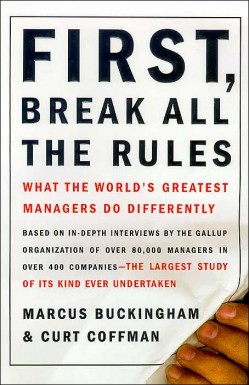 Author: Marcus Buckingham and Curt Coffman
Author: Marcus Buckingham and Curt Coffman
Started: 30 May 2009
Finished: 1 Nov 2009
271 p / 156 d
1.7 p/d
So, this was a book that my manager at work had picked to be the focus of a little reading group sort of thing where several of us would read this and every couple of weeks or whatever we would discuss a bit of it over lunch. Well, that never materialized, but I read it anyway. Slowly. Over a long period of months.
This is another one of those books where I never got the compelling feeling of needing to turn the page, where instead it felt like somewhat of a chore. So, since that reading group was not actually happening, the result was I would read a few pages, then put the book down for a month or whatnot before reading more. This is a short book. It is an “easy read”. The whole thing could be read in a couple of hours. In fact, I finished it when one day I just decided I wanted to be done so I could move on to the next book, so I finished it off that afternoon. But I never felt, on my own, that this was an exciting text where I was eager to get to the next page.
Now, that aside, the actual content itself… this is one of that whole cottage industry of books on how to be a good manager. The key elements of this one are basically around recognizing the differences between the innate qualities people have vs things that are changeable and adaptable… and basically that you should work to figure out the best ways to take advantage of natural innate strength and not spend a lot of time or energy trying to “change people” to make them match expectations in a particular role. There was more nuance of course, and they backed things up through studies and illustrated them with anecdotes… and they made a few other points as well. But I think that was the main one.
I guess my primary take away from this was that some of the points probably should be obvious, but are clearly not. Other things seemed like good insights. But it could have all been fit as a few general statements on a poster or something, it didn’t seem like stuff that really needed a whole book, even a pretty light 271 page book to get across. OK, I guess laying it out methodically and having a lot of illustrative anecdotes can be helpful to get the point across and to put weight behind what would otherwise just be declarative aphorisms. OK, I get that. I just was feeling “OK, I get that point already, lets move on” pretty often.
It did have some good points though, and probably highlighted some things that even if I was aware of, I have not been fully utilizing at work, and perhaps I should… so that is good I guess. :-)